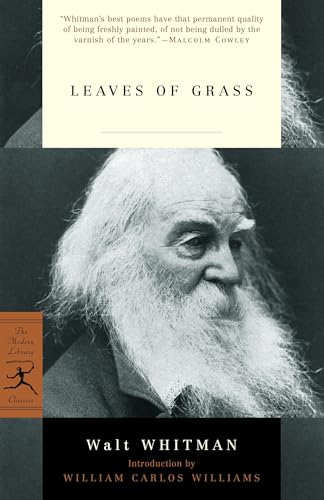Leaves of Grass
The "Death-Bed" Edition (Modern Library Classics)
Walt Whitman
BOOK REVIEW

Leaves of Grass: The "Death-Bed" Edition is not just a book; it's an audacious proclamation of the human spirit and a thrilling embrace of life in all its chaotic beauty. Walt Whitman, that poetic bard of America, invites you to plunge into an ocean of sensations, thoughts, and feelings that encapsulate the very essence of existence. This is where he bears his soul, where he strips ideology and embraces humanity with both its grandeur and its grime.
Picture yourself amidst the lush fields of the American landscape, where Whitman's verses sing louder than the roaring winds. His work is steeped in the 19th-century ethos, a time of change and revolution, as industrialization began to tangle with the wilderness. In the face of civil strife and social upheaval, Whitman's poetry became a heartbeat, a vital connection between humanity and the infinite cosmos. By invoking the natural world, he showcases the interconnectedness of all beings, calling you-yes, you-to recognize your place within this intricate tapestry of life.
As you dive into the "Death-Bed" Edition, you encounter not just poetry, but an electric charge of emotion that crackles in each line. The work is saturated with the joy of existence, the melancholy of mortality, and the raw fervor of an unfiltered experience. Whitman doesn't shy away from life's darkest corners; rather, he embraces them as part of the human experience. He seduces you into celebrating the mundane while simultaneously urging you to contemplate the profound.
Readers often find themselves lost in the sensuality of Whitman's language. One critic waxes poetic themselves, stating, "Whitman doesn't just write about being alive; he makes you feel the pulse of life through every synapse." This visceral reaction is echoed by countless others, who, after reading, often feel an inexplicable urge to stand and scream the beauty of life from the rooftops.
Of course, not all interpretations of Whitman's work are clad in adoration. Some critics have hesitated, wary of what they perceive as his excessive idealism or the unbridled celebration of self. It's important to grapple with this discomfort; after all, Whitman dares you to confront the contradictions of your own existence. His poetry might disrupt, provoke, or even infuriate-yet that is where its true power lies. The energy of outrage can transform into introspection, turning a casual reader into an impassioned seeker of deeper truths.
This dynamic between fervent devotion and biting criticism paints Whitman as a polarizing figure in literature. Yet there's no denying his vast influence. Figures like Allen Ginsberg and Maya Angelou found their voices in the swelling chords of Whitman's verses. His celebration of individuality and self-expression paved the way for modern poetry, urging generations to peel back their layers and embrace their authentic selves.
Reflecting on the historical landscape during which Whitman penned his verses, the themes of freedom and unity resonate louder than ever. The shadows of the Civil War loom large over his work, a reminder that in times of division, art can become a means of reconciliation and understanding. This aspect of Whitman's work remains relevant today; in our current socio-political tumult, readers are called yet again to engage with the complexities of identity and belonging.
The "Death-Bed" Edition brings a sense of closure, an introspective journey toward mortality, echoing the sentiment that our time on this earth is fleeting, yet precious. Each poem serves as a testament to life's fleeting moments-a reminder to cherish every heartbeat and embrace every emotion. Whitman speaks not just for himself, but for every human who has ever yearned for connection, joy, or understanding.
As the pages of Leaves of Grass turn, you're left with a cascade of thoughts and emotions. It's a vortex of humanity, drawing you in and refusing to let go, igniting within you a smoldering desire to not only experience life but to document your own existence. What will you leave behind? What songs will echo long after you're gone? 📜
The call to arms is clear: read, reflect, and rise to the challenge of acknowledging your existence in all its messy, miraculous glory. Don't just let Whitman's words wash over you; let them settle into your bones, challenge you, and inspire you to stand up, shout out, and engage with the world on a level that shakes the very foundations of your being. 🌍💥
📖 Leaves of Grass: The "Death-Bed" Edition (Modern Library Classics)
✍ by Walt Whitman
🧾 800 pages
2000
#leaves #grass #death #bed #edition #modern #library #classics #walt #whitman #WaltWhitman